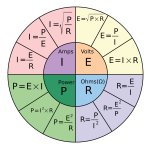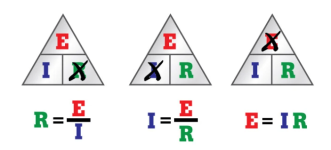Electron flow, Iq, is measured in amps. Think water flow in pipes and you will understand that current, Iq, is electrons flowing in the circuit., wires, components etc. Same as water in pipes flowing but you cannot see them. Electronics is the study of electron flow.
Electronic engineers and electronic trained guys like Zen Mod us abbreviations. They speak a different language from many of us hobbyist, the language of electronics.
Electronic engineers and electronic trained guys like Zen Mod us abbreviations. They speak a different language from many of us hobbyist, the language of electronics.
Last edited:
For someone that wants to do any sort of electronics as a hobby and begin to gain an understanding of how this stuff works, you will want to memorize the three simple ohm's law equations and know them like the back of your hand. In addition to the picture the simple power formula is another must memorize... P=IE (power = current times voltage) For example when you want to determine the power dissipation in a resistor.. With the example in post #1... I want to know what the dissipation is on the .47 ohm resistor in the output stage ZM told me to measure. I haved adjusted the circuit to have .7 volts across the .47 ohm resistor. We memorized ohm's law already and know that I=E/R, so current through it is about 1.5 amps. We memorized the power formula (P=IE) so we now know the dissipation on that resistor is: 1.5 amps times .7 volts= about 1 watt.. (A 2 watt rated resistor would be OK there)
Attachments
I enjoyed taking some online courses in electronics. One I even paid money to take. I was an introvert nerd. That video is like 10 hours, could be done in one day off work, and then one can follow the big dogs like Zen when they speak on this forum. Not the same as going to college or technical school but good enough for someone who just wants to play with electronics as a hobby.naah
learning is boring
we can do Lego style
all we need is some luck

Being almost 75 years old with CRS (can't remember s**t) setting in it is all I can do to remember to zip up my pants before leaving the house now. I did enjoy learning and playing with electronics after retiring 15 years ago. The guys on this forum played a big part of it. I have built the majority of Nelson's projects. Fun learning something new after retiring.
I sometimes recommend that those who are interested in learning more get a copy of "The Art of Electronics" by Horowitz & Hill.
It is a thick tome, or very large PDF file, and covers all the basics and then some. I really hate watching YouTube vids. I nice hardback textbook is a great reference to have, and one can digest at one's leasure.
It is a thick tome, or very large PDF file, and covers all the basics and then some. I really hate watching YouTube vids. I nice hardback textbook is a great reference to have, and one can digest at one's leasure.
I am just the opposite, rather watch a video. When a kid maybe but wading through a book was just not my thing at 60 years old. No question possible the best way along with an electronic course but that is for those really, really serious learning electronics and possible working in the field. It was just for something to pass the time for me after retiring. Hobby.
Now here is the fun part..
We get to listen to our creations after using a few basic EE tools. I like to say that I perform a few basic measurements to make sure my latest amp is basically functional, or isn't broken. Going into extensive measurements can be like falling down a rabbit hole. Best not to forget the purpose of the hobby, which is to help one enjoy music. Sure, building things is fun, but music is where it's at.
We get to listen to our creations after using a few basic EE tools. I like to say that I perform a few basic measurements to make sure my latest amp is basically functional, or isn't broken. Going into extensive measurements can be like falling down a rabbit hole. Best not to forget the purpose of the hobby, which is to help one enjoy music. Sure, building things is fun, but music is where it's at.
Reading thru this I again wondered why voltage is represented by E. With a little help from google I ended up on Fluke's Learning page, looks like a nice simple explanation for many electrical terms etc. Seems like a valuable resource for those of us wanting to follow along when the SMart guys on here speak.
Also started listening to the link supplied by @wdecho, but that gonna take some time and serious concentration. Time I seem to have, concentration.....
Also started listening to the link supplied by @wdecho, but that gonna take some time and serious concentration. Time I seem to have, concentration.....
I did have some electronic courses in my teens and did have a basic understanding of electronics before watching that video. Also I had taken another course before watching it so for a beginner it can be a lot to take in at once. You can build the projects here with just the basics knowledge of electronics if you can solder and follow directions but being curious I wanted to know what was happening in the circuit. As I already said electronics is the study of an electron flow and all the components in the device are there to manipulate the electron flow to do the intended job the device was designed to do.
Well, not so sure one even needs a basic knowledge LOL! with the outstanding teams who design, make guides, the super helpful folks etc. I've managed to assemble 2 ACA Minis. Just saying if you can solder many of these projects are very doable for beginners, although 1 word of caution, this can be highly addictive!You can build the projects here with just the basics knowledge of electronics
Luck, the lazy man's excuse for success, though a little luck never hurts!all we need is some luck
- Home
- Amplifiers
- Pass Labs
- Understanding Iq

